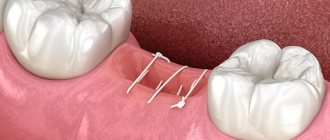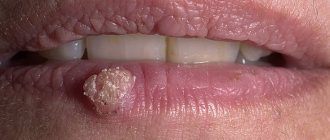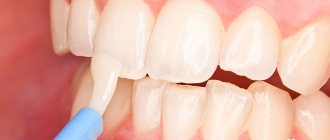The diagnosis of macroglossia is made if the tongue becomes excessively enlarged and thickened. With macroglossia, this muscular organ is pathologically changed or has some anomalies in its structure. This usually occurs due to developmental disorders of the fetus or is a consequence of some pathological process in the body. With this disease, the tongue becomes covered with folds, which further interfere with its proper dynamics. More often the disease occurs in childhood.
If the normal weight of the tongue is from 60 to 80 grams, then with this pathology it “grows” to 120 grams or more.
Both the entire organ and its individual parts (lateral surfaces, back or tip) can increase in size. Because of this, teeth marks may be imprinted on it. Often the tongue may not fit in the mouth and protrude outward.
Macroglossia - causes of tongue enlargement and consequences of the anomaly
From time immemorial, language has served as the main indicator of human health. Any changes in its appearance and structure, the appearance of plaque and neoplasms are all direct signals that some pathological processes are occurring in the body. One of the most serious phenomena is considered to be an increase in the size of the main speaking organ. This condition is medically called macroglossia. Further in this material we will talk about what it is, why such an anomaly occurs in adults and children, what methods are used today to treat the pathology.
Emily Schlenker
It turns out that Byron's peculiarity can be inherited. Thus, the world record holder’s own daughter inherited her father’s impressive muscle size. Her tongue is slightly smaller than Byron's and is 7.3 centimeters wide , but this is larger than that of the previous record holder.
Emily Schlenker and her father are registered in the Book of Records as the couple with the largest tongues. Of course, the girl was also subjected to ridicule from peers and family friends, but she is optimistic about her peculiarity.
What is a pathological phenomenon?
Macroglossia or enlarged tongue syndrome can be regarded as an anomaly in the development of an organ or a pathological deformation of its shape due to a certain disease. The tongue becomes denser, may partially or completely increase in size and even protrude outside the mouth if it no longer fits inside. Certain changes occur in the structure of the organ, due to which its surface becomes covered with numerous folds and becomes rough. All this leads to severe discomfort, the inability to fully chew food and breathe freely.
Enlarged tongue syndrome
Therapeutic effect
When choosing the type of therapy, the doctor takes into account the form of the disease and the cause of its origin. If this pathology is caused by a secondary disease, the cause should be treated in parallel. The general treatment algorithm involves the use of the following medications:
- antibacterial drugs that are used orally or injected;
- antiseptic solutions that are used for local treatment of the surface of the muscular organ;
- the use of anti-inflammatory drugs for treating the tongue.
When treating the main disease that caused macroglossia, with an integrated approach, medications have a positive effect on the organ, it gradually becomes smaller in size. The therapy is long-term, the duration of the course of taking medications is determined by the treating doctor. It is also necessary to undergo regular examinations, since treatment adjustments may be necessary as the patient recovers.
Causes of macroglossia
Most often, the cause of the development of anomalies is congenital pathologies. Thus, the cause of the problem in newborns may be a benign neoplasm that began to grow at the stage of intrauterine development of the fetus, or an idiopathic disease with muscular hypertrophy of the tongue. Other possible prerequisites, dental experts include, are negative influences and conditions during pregnancy, acute infections, radiation exposure, alcohol poisoning, and hereditary factors. Experts also identify a number of genetic disorders, including the formation of cysts in the oral cavity during the formation of the tongue muscles1.
Read more about childhood tongue diseases in our special article>>>
“By the way, I also had no idea about this disease until a work colleague encountered something similar. As far as I understand, something went wrong during pregnancy, and the child was diagnosed with a congenital cyst on the tongue. I had to undergo surgery, and rehabilitation was not easy. It seems like everything is fine with the baby now...”
Kim7, Izhevsk, from correspondence on the woman.ru forum
As for adult patients, in this case macroglossia can result from the following phenomena and processes:
- malfunction of the thyroid gland, hormonal disorders,
- absence of all teeth in the mouth - complete edentia,
- open bite,
- amyloidosis – a disorder of protein metabolism,
- glycogenosis – disorders of the synthesis and breakdown of glycogen,
- pellagra is one of the forms of vitamin deficiency,
- rhinoscleroma – formation of nodules on the mucous membrane of the oral cavity and nasopharynx,
- syphilis, tuberculosis,
- neoplasms of both benign and malignant nature,
- inflammatory processes accompanied by the formation of pus,
- angioedema in acute form,
- “flaccid” tongue syndrome, characteristic of neurological disorders,
- intramuscular hemorrhage,
- candidiasis (fungal infections),
- malfunctions of the hematopoietic system,
- catarrhal glossitis.
There can be many causes of the pathology.
Sometimes a severe allergic reaction can provoke the problem. Also in medical practice, there are cases when the patient’s overweight becomes a prerequisite for pathology.
Diagnostic measures
When undergoing a routine ultrasound examination during the third trimester of pregnancy, the doctor may detect congenital macroglossia. It is determined after comparison with the norms of each age at a given stage of fetal development. To make an accurate diagnosis, a repeat test is scheduled.
After the birth of the child, an examination awaits from many specialists - an infectious disease specialist, geneticist, otolaryngologist, endocrinologist. An instrumental examination is carried out, and a biochemical study of the blood fluid is prescribed. Based on the results of all tests and diagnostic methods, a diagnosis is made and therapy is prescribed.
Characteristic symptoms
In order to respond to a problem in a timely manner, you need to know what signs to recognize it. Here are the main symptoms of macroglossia:
- enlarged tongue, to the point where the organ no longer fits in the oral cavity,
- dryness of mucous membranes,
- difficulty breathing, asthma attacks,
- difficulty chewing and swallowing food,
- lumpy surface of the tongue
- enlarged taste buds
- excessive salivation,
- inability to close your mouth normally,
- formation of bleeding cracks on the back,
- diction problems,
- often an increase in temperature, the addition of common infections.
With this pathology, it is impossible to close the mouth normally.
Gradually, the patient’s condition worsens, the bite is deformed, and ulcers appear on the back of the organ. The area around the mouth becomes inflamed and irritation occurs.
Nick Afanasiev
A Russian emigrant, now living in the United States, decided to announce himself to the world and become famous. So, he discovered that the length of his tongue was 8.9 centimeters .
This feature could help him gain fame, especially since Nick Afanasyev dreamed of becoming a popular actor. The ability to reach his nose and elbow gained fame for the guy when he posted a video online. Then the views reached more than a million, and the guy began to receive long-awaited invitations to auditions.
Thus, the unusual young man starred in the teen series iCarly, and now his filmography has exceeded 10 projects. It turns out that not only speakers and singers can make money with a language.
How is macroglossia treated today?
The treatment method is selected taking into account the reasons that led to the increase in the size of the tongue. The doctor also takes into account all the changes that have occurred during the development of the disease. In the event that macroglossia is the result of some systemic disease, the root cause of the disease is treated first.
Drug therapy
We already said above that the problem may be the result of an infectious infection. In this case, specialists usually prescribe drug therapy aimed at eliminating the causative factor. As a rule, these are antibiotics, drugs that help normalize metabolic processes, restore the functioning of blood and lymphatic vessels, and agents that stimulate tissue regeneration. Special medications may also be prescribed to treat the surface of the tongue and oral mucosa in order to relieve swelling and inflammation.
If the cause of the pathology is an infection, then antibiotics are prescribed
Surgery
When the situation becomes more serious, surgery may be required. Typically, the surgical method is used to correct a birth defect, immediately after the birth of a child. There are several methods of such treatment:
- resection of the affected organ area,
- phlebectomy or sclerotherapy - usually performed when the cause of the disease is malfunction of the blood vessels. When performing a phlebectomy, the doctor removes damaged vessels, and in the second, he injects a special drug that stimulates the restoration of their functionality,
- blocking the lingual artery - this method is usually used when a child needs treatment at the stage of active growth. In this way, it is possible to minimize the supply of hormones, and the size of the tongue begins to return to normal,
- trimming the frenulum - the organ is raised to maximum tension, after which the frenulum is shortened to 1.5 cm. An advantage is the fact that the operation does not require sutures.
In some cases, surgical intervention is required.
The optimal treatment option is an integrated approach to treatment. The fastest and highest quality results can be achieved by combining drug therapy and surgical treatment.
What parents should pay attention to and be wary of
- Breathing through the mouth if the child does not have a runny nose.
- No gaps between teeth by 4-5 years.
Baby teeth are small and there is usually always room for them, even if the jaw has not developed enough. As the child grows up and prepares for a mixed dentition, so-called trema should appear between the baby teeth - small but distinct distances. When baby teeth fall out, permanent teeth will erupt, which are much wider than baby teeth, and they should have enough space for normal growth and the formation of an even, beautiful dentition.
- Observe the child’s swallowing of saliva; normally, swallowing occurs imperceptibly, without tension in the facial muscles.
Usually, during an appointment, a pediatric dentist draws the attention of parents to the emerging problems of forming a correct bite and refers such children to an orthodontist.
If this does not happen, it is necessary to show the child at the age of 4-5 years to a pediatric orthodontist, preferably one who takes into account the functional approach in his work.
What could be the consequences if treatment is not started on time?
Macroglossia is not just an aesthetic defect, but a serious pathological phenomenon that can lead to dangerous consequences. Among the possible negative developments, dental experts highlight the following phenomena:
- serious disruptions in the functioning of the lungs, frequent cases of asphyxia, which in the worst circumstances can even lead to death,
- the formation of malocclusion in children, which also negatively affects the condition of the body as a whole,
- disturbances in the functioning of the gastrointestinal tract, since with such a pathology it is quite difficult to chew food thoroughly,
- deformation of teeth and soft tissues of the oral cavity,
- speech dysfunction and problems with the patient’s social adaptation.
Frequent biting of the organ, the appearance of cracks and microtraumas cannot be avoided - all this causes serious inconvenience and can provoke the development of an infectious process. It is important to respond to the problem in a timely manner in order to prevent possible complications.
- Matveev, PC Clinical system for diagnosing macroglossia, 2013.
Byron Schlenker
The funny, plump American man, at first glance, is no different from other people, until he opens his mouth. Byron Schlenker is the owner of the longest and widest tongue (it reaches 8.6 cm !).
Just so you understand, Schlenker’s tongue is wider than a beer mat or the screen of an iPhone 6. The man broke the previously set Guinness record by a full centimeter, thanks to which he became a celebrity in his hometown.
Byron's wife confesses that his comrades still make fun of the man, but he is quite good-natured about their jokes. The man happily signs autographs and takes pictures with fans, of whom he has many.
Nick Stoberl
The young man defeated the previous record holder four years ago - the length of his tongue was just over 10 centimeters . The record holder comes from America, where he works part-time as a comedian and artist.
He optimistically and cheerfully demonstrates the peculiarity of his body to everyone, takes pictures with fans and maintains personal pages on social networks. The guy is glad that he can amuse his friends and fans with his tricks. Nick Stoberl admits that his father also had an unusually long tongue, meaning the phenomenon was inherited.
The guy said that it was not easy to officially register his record, since his ambitions coincided with the 60th anniversary of the existence of the Book of Records. So, before the anniversary edition, all record holders were checked very meticulously, but the guy was able to get into it, which he is very proud of.











